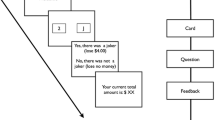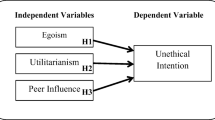Abstract
This research examines business and psychology students’ attitude toward unethical behavior (measured at Time 1) and their propensity to engage in unethical behavior (measured at Time 1 and at Time 2, 4 weeks later) using a 15-item Unethical Behavior measure with five Factors: Abuse Resources, Not Whistle Blowing, Theft, Corruption, and Deception. Results suggested that male students had stronger unethical attitudes and had higher propensity to engage in unethical behavior than female students. Attitude at Time 1 predicted Propensity at Time 1 accurately for all five factors (concurrent validity): If students consider it to be unethical, then, they are less likely to engage in that unethical behavior. Attitude at Time 1 predicted only Factor Abuse Resources for Propensity at Time 2. Propensity at Time 1 was significantly related to Propensity at Time 2. Attitude at Time 1, Propensity at Time 1, and Propensity at Time 2 had achieved configural and metric measurement invariance across major (business vs. psychology). Thus, researchers may have confidence in using these measures in future research.
Similar content being viewed by others
References
Ajzen I., Fishbein M. (1980) Understanding Attitudes and Predicting Social Behavior. Prentice Hall, Englewood Cliffs, NJ
Betz M., O'onnell L., Shephard J. M. (1989) Gender Differences in Proclivity for Unethical Behavior. Journal of Business Ethics 8(5):321–324
Blanchard K. H., Hodges P. (2003) Servant Leader. Thomas Nelson, Inc, Nashville, TN
Bok D. (1993) The Cost of Talent: How Executives and Professionals are Paid and How it Affects America. The Free Press, New York
Cheung G. W., Rensvold R. B. (2002) Evaluating Goodness-of-fit Indexes for Testing Measurement Invariance. Structural Equation Modeling 9(2):233–255
Cohen-Charash Y., Spector P. E. (2001) The Role of Justice in Organizations: A Meta-Analysis. Organizational Behavior and Human Decision Processes 86:278–321
Colson C. (1999) Against the Night: Living in the New Dark Ages. MI: Servant Publications, Ann Arbor
Corruption Perception Index. http://www.transparency.org/documents/cpi/2001/cpi2001.html.
Contry-Murray A. (2001) February, ‚The Pros and Cons of Employee Surveillance’. Network Magazine 16(2):62–65
Crainer S., Dearlove D. (1999) Gravy Training: Inside the Business of Business Schools. Jossey-Bass, San Francisco
Deshpande S. P. (1997) Manager’s Perception of Proper Ethical Conduct: The Effect of Sex, Age, and Level of Education. Journal of Business Ethics 16(1):79–85
Du L. Z., Tang T. L. P. (2005) Measurement Invariance Across Gender and Major: The Love of Money among University Students in People’s Republic of China. Journal of Business Ethics 19:281–293
Eagle B. W., Miles E. W., Icenogle M. L. (2001) Male and Female Interpretations of Bi-directional Work-Family Conflict Scales: Testing for Measurement Equivalence. In: Schriesheim C. A., Neider L. L. (eds) Equivalence in measurement. Information Age Publishing, Connecticut, pp. 5–23
Economist: 2004, ‚Special Report: But Can You Teach It? – Business schools’, 371 (8376), 81, May 22nd
Epitropaki O., Martin R. (2004) Implicit Leadership Theories in Applied Settings: Factor Structure, Generalizability, and Stability Over Time. Journal of Applied Psychology 89(2):293–310
Etzioni A. (2002) ‚When It Comes to Ethics, B-schools get an F’, The Washington Post, August 4, B4
Feiner M. (2004) The Feiner Points of Leadership. Warner Business Books, New York
Giacalone R. A. (2004) A Transcendent Business Education for the 21st Century. Academy of Management Learning and Education 3(4):415–420
Greenberg J. (1993) Stealing in the Name of Justice: Informational and Interpersonal Moderators of Theft Reactions to Underpayment Inequity. Organizational Behavior and Human Decision Processes 54:81–103
Greenberg J. (2002) Who Stole the Money, and When? Individual and Situational Determinants of Employee Theft. Organizational Behavior and Human Decision Processes 89(1):985–1003
Greenleaf R. K., Frick D. M., Spears L. C. (1996) On Becoming a Servant Leader. Jossey-Bass Publisher, San Francisco
Hoffman J. J. (1998) Are Women Really More Ethical than Men? Maybe It Depends on the Situation. Journal of Managerial Issues 10(1):60–73
Honeycutt E. D., Glassman M., Zugelder M. T., Karande K. (2001) Determinants of Ethical Behavior: A Study of Autosalespeople. Journal of Business Ethics 32(1):69–79
Hunt S. D., Vitell S. (1986) A General Theory of Marketing ethics. Journal of Macromarketing 6:5–16
Hunt S. D., Wood V. R. N., Chonko L. B. (1989) Corporate Ethical Values and Organizational Commitment in Marketing. Journal of Marketing 53:79–90
Idaszak J. R., Bottom W. P., Drasgow F. (1988) A Test of the Measurement Equivalence of the Revised Job Diagnostic Survey: Past Problems and Current Solutions. Journal of Applied Psychology 73(4):647–656
Ivancevich J. M., Konopaske R., Matteson M. T. (2005), Organizational Behavior and Management. McGraw-Hill Irwin, Boston
Ivancevich J. M., Duening T. N., Gilbert J. A., Konopaske R. (2003) Deterring White-Collar Crime. Academy of Management Executive 17:114–127
James, T. A. W. and T. L. P. Tang: 1996, `Downsizing and the Impact on Survivors – A Matter of Justice’, Employment Relations Today (Summer), 33–41
Jones G. E., Kavanagh M. J. (1996) An Experimental Examination of the Effects of Individual and Situational Factors on Unethical Behavioral Intentions in the Workplace. Journal of Business Ethics 15:511–523
Kercheval, N.: 2004, `Full-time MBA Students Required to Visit Federal Prisons and Interview White-Collar Criminals’, The Daily Record (May 21), Baltimore, MD, 1
Kochan T. A. (2002) Addressing the Crisis in Confidence in Corporations: Root Causes, Victims, and Strategies for Reform. Academy of Management Executive 17:139–141
Lewin A. Y., Stephens C. U. (1994) CEO Attitudes as Determinants of Organization Design: An Integrated Model. Organization Studies 15(2):183–202
Lim V. K. G. (2002) The IT way of Loafing on the Job: Cyberloafing, Neutralizing and Organizational Justice. Journal of Organizational Behavior 23:675–694
Locke E. A. (1969) What is Job Satisfaction? Organizational Behavior and Human Performance 4:309–336
Lonkevich D. (1997) Flexibility Urged in Profits and Ethics Demands. National Underwriter: Property and Casualty/Risk and Benefits Management Edition 101:8–10
Luna-Arocas R., Tang T. L. P. (2004) The Love of Money, Satisfaction, and the Protestant Work Ethic: Money Profiles Among University Professors in the U.S.A. and Spain. Journal of Business Ethics 50:329–354
Luo Y. (2005) An Organizational Perspective of Corruption. Management and Organization Review 1:119–154
Malinowski C., Berger K. A. (1996) Undergraduate Student Attitudes about Hypothetical Marketing Dilemmas. Journal of Business Ethics 15(5):525–535
Maurer T. J., Raju N. S., Collins W. C. (1998) Peer and Subordinate Performance Appraisal Measurement Equivalence. Journal of Applied Psychology 83(5):693–702
Merritt, J.: 2002, ‚The Best B-Schools’, Business Week (October 21), 85–100
Merritt, J.: 2004, ‚Welcome to Ethics 101’, Business Week (October 18), 90
Mintzberg H., Gosling J. (2002) Educating Managers Beyond Borders. Academy of Management Learning and Education 1:64–76
Perotin, M. M.: 2002, September 23, “It’s Only a Pencil” Adds up to Billions When Workers Take Office Supplies’, Knight Ridder Tribune Business News, 1
Pfeffer J., Fong C. T. (2002) The End of Business Schools? Less Success Than Meets the Eye. Academy of Management learning and Education 1:78–95
Podsakoff P. M., MacKenzie S. B., Lee J. Y., Podsakoff N. P. (2003) Common Method Biases in Behavioral Research: A Critical Review of the Literature and Recommended Remedies. Journal of Applied Psychology 88:879–903
Richman W. L., Kiesler S., Weisband S., Drasgow F. (1999) A Meta-analytic Study of Social Desirability Distortion in Computer-Administered Questionnaires, Traditional Questionnaires, and Interviews. Journal of Applied Psychology 84:754–775
Riordan C. M., Vandenberg R. J. (1994) A Central Question in Cross-cultural Research: Do Employees of Different Cultures Interpret Work-Related Measures in an Equivalent Manner? Journal of Management 20:643–671
Riordan C. M., Richardson H. A., Schaffer B. S., Vandenberg R. J. (2001) Alpha, Beta, and Gamma Change: A Review of Past Research with Recommendations for New Directions. In: Schriesheim C. A., Neider L. L. (eds) Equivalence in Measurement. Information Age Publishing, Connecticut, pp. 51–97
Robinson S. L., Bennett R. J. (1995) A Typology of Deviant Workplace Behaviors: A Multidimensional Scaling Study. Academy of Management Journal 38:555–572
Schein EH. (2004) Learning When and How to Lie: A Neglected Aspect of Organizational and Occupational Socialization. Human Relations 57:260–273
Tang T. L. P., Chiu R. K. (2003) Income, Money Ethic, Pay Satisfaction, Commitment, and Unethical Behavior: Is the Love of Money the Root of Evil for Hong Kong employees? Journal of Business Ethics 46:13–30
Tang, T. L. P. and T. L. N. Tang: 2003, ‚The Love of Money is The Root of Evil: A Study of 26 Cultures. Symposium: The Love of Money, Workplace Deviance, Commitment, and Satisfaction Across Cultures’ Paper Presented at the 63rd Academy of Management Annual Meeting (August 1–6), Seattle, WA
Tang T. L. P., Luna-Arocas R., Sutarso T. (2005) From Income to Pay Satisfaction: The Love of Money and Pay Equity Comparison as Mediators and Culture (the U.S. and Spain) and Gender as Moderators. Management Research: The Journal of the Iberoamerican Academy of Management 3(1):7–26
Trank C. Q., Rynes S. L. (2003) Who Moved Our Cheese? Reclaiming Professionalism in Business Education. Academy of Management Learning and Education 2:189–205
Trevino L. K., Youngblood S. A. (1990) Bad Apples in Bad Barrels: A Causal Analysis of Ethical Decision-Making Behavior. Journal of Applied Psychology 75:378–385
U.S. Department of Education (1989) Digest of Education Statistics. Government Printing Office, Washington, D.C.
Vandenberg R. J., Lance C. E. (2000) A Review and Synthesis of the Measurement Invariance Literature: Suggestions, Practices, and Recommendations for Organizational Research. Organizational Research Methods 3(1):4–69
Vardi Y., Weitz E. (2004) Misbehavior in Organizations. Lawrence Erlbaum, Mahwah, NY
Vardi Y., Wiener Y. (1996) Misbehavior in Organizations: A Motivational Framework. Organization Science 7(2):151–165
Weaver G. R., Agle B. R. (2002) Religiosity and Ethical Behavior in Organizations: A Symbolic Interactionist Perspective. Academy of Management Review 27:77–97
Wells J. T. (2001) Why Employees Commit Fraud. Journal of Accountancy (February) 191(2):89–92
Acknowledgments
The authors would like to thank late Father Wiatt Funk and Richard Leggatt for their encouragement and Amy Watson and James Van Buren for their assistance.
Author information
Authors and Affiliations
Corresponding author
Additional information
Yuh-Jia Chen received his Ph.D. in Measurement, Evaluation, and Statistics at Teachers College, Columbia University (with a M.A. in Organizational Psychology and M.S. in Applied Statistics). His research interests lie in choice and decision making under risk, money attitude, and resource allocation behavior. Currently, he is an Assistant Professor of Psychology at Middle Tennessee State University.
Thomas Li-Ping Tang (Ph.D., Case Western Reserve University) is a Full Professor of Management in the Department of Management and Marketing, Jennings A. Jones College of Business at Middle Tennessee State University (MTSU), Murfreesboro, Tennessee, 37132. He has taught Industrial and Organizational Psychology at National Taiwan University and at MTSU. His primary research interests are in work motivation, compensation, money attitudes, the Love of Money, unethical behavior, pay satisfaction, turnover, stress, and cross-cultural issues. He has published more than 100 journal articles (e.g., Journal of Applied Psychology, Personnel Psychology, Human Relations, Journal of Management, Management Research, Journal of Organizational Behavior, and Journal of Business Ethics) and presented more than 180 papers in professional conferences and invited seminars around the world. He is (was) a member of the review board for 5 journals and serves as a reviewer for 26 journals around the world. He was the winner of two Outstanding Research Awards (1991, 1999) and Distinguished International Service Award (1999) at Middle Tennessee State University. He also received the Best Reviewer Award from the International Management Division of the Academy of Management in Seattle, WA (2003).
Rights and permissions
About this article
Cite this article
Chen, YJ., Tang, T.LP. Attitude Toward and Propensity to Engage in Unethical Behavior: Measurement Invariance across Major among University Students. J Bus Ethics 69, 77–93 (2006). https://doi.org/10.1007/s10551-006-9069-6
Published:
Issue Date:
DOI: https://doi.org/10.1007/s10551-006-9069-6




